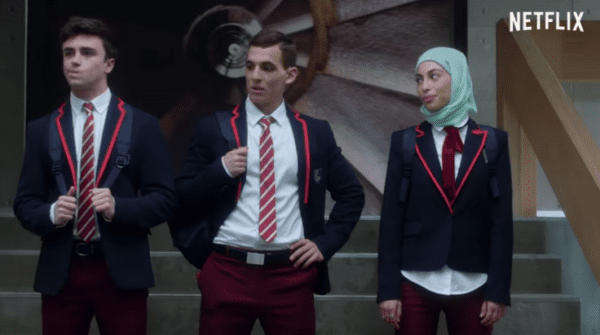
Teenage sex, illicit drugs, and a school ban on hijabs. The plot twists in the fictional life of Nadia, a Muslim character in the Netflix series Elite, lead reflective views to an ethical dilemma: the creative freedoms of entertainment producers seem to conflict with the need to avoid potentially harmful stereotypes in mass media. Set in the private prep school Las Encinas outside the bustling city of Madrid, Spain, Elite tells the coming-of-age story of rowdy students tempted by drugs, steamy affairs, and illegal activity. Nadia is one of three new students who interrupt the status quo when they receive scholarships to attend Las Encinas after their public school is destroyed. Elite touches on controversial issues that face teenagers around the world, such as HIV, socioeconomic discrimination, and Islamophobia. The show has received both praise and criticism for its portrayal of Nadia, who is Palestinian. Out of this debate emerges an important question: does Elite portray Nadia as a heroic feminist or harmful Muslim cliché?
According to the show’s writers, Nadia embodies the struggles Muslims face as they integrate into European society. For example, the show depicts Islamophobic comments from Las Encinas student Lucrecia, who calls Nadia derogatory names such as “Miss Palestine” and “Taliban.” And in the first season, Nadia is told she cannot wear her headscarf and faces expulsion from school. Nadia’s dilemma represents a real issue emerging in Europe. In 2004, French public schools banned the use of all religious accessories, and a Muslim girl reportedly missed a week of school in 2016 after refusing to remove her headscarf. Once Nadia removes her hijab, to the disappointment of her conservative father, she begins making friends, and even catches the eye of a fellow classmate, Guzman. Meanwhile, Nadia’s good grades earn her the top of the class, eventually winning the approval of her parents.
The co-producer of Elite claims the character of Nadia communicates “something that is happening in Europe … the reality we see every day.” Arab News applauds the series for its depiction of Nadia and for showing the struggles of Muslims integrating into Europe. Some Muslim Elite fans agree, commenting on the show’s Instagram that “they have really respected our culture” and claiming that Nadia is a fair depiction of Muslim women. “Nadia is a fighter,” they say, a feminist hero, and “she doesn’t need a man to be strong.” But others question how the storyline of a conservative Muslim girl having sex in a private school bathroom with a fellow classmate unfolds. Nadia goes from being preoccupied about taking off her headscarf to participating in a steamy affair with her love interest, Guzman. Muslim journalist Mariam Khan believes Elite does deserve credit for including a Palestinian girl as one of the main characters but takes issue with how it seems to communicate that only by denouncing her religion can she truly be free to enjoy herself. Khan claims the affair with Guzman frames the story of Nadia within a white savior complex, in which a white student rescues Nadia from her oppressive religion.
When the show’s Twitter account posted a video of Nadia confidently walking into a discotheque in Spain without her hijab and titled it “QUEEN,” the response of the Muslim Twitter community was divided. One Twitter user commented, “this is gonna be my fav scene. We stan [support] queen Nadia.” But another wrote, “A muslim woman who removes her veil to be free? IT’S AN ISLAMOPHOBIC CLICHÉ,” while another commented, “can Netflix hire a Muslim woman so she can write Nadia a good storyline empowering her without -taking off- her hijab and drinking?”
Discussion Questions:
- What values might come into conflict when entertainment media portray members of various ethnic or religious groups?
- How do we judge whether a show’s depiction of an ethnic or religious minority is ethical? What role do the motives of a show’s creators play in evaluating this ethical conflict?
- Does there need to be a Muslim woman writing the story of Nadia in order to fairly depict the character?
- What ethical responses are available to media consumers when they deem a show to have committed an ethical breach? Is it ethical to enjoy an ethically-flawed show?
Further Information:
Alameri, R. (Oct. 6, 2018). “New Netflix drama ‘Elite’ explores Islamophobia in Europe.” Retrieved from https://www.arabnews.com/node/1383426/art-culture
EliteNetflix. (Sep. 6, 2019). QUEEN pic.twitter.com/2cXM9KVRPe. Retrieved from https://twitter.com/EliteNetflix/status/1169928317098745856
Gomez, I. (Nov. 7, 2018). “There’s a Problem with the Depiction of Palestinians in ‘Elite.’ Retrieved from https://i-d.vice.com/en_us/article/d3bz8x/theres-a-problem-with-the-depiction-of-palestinians-in-elite
Khan, M. (Nov. 15, 2019). “TV needs to stop ‘empowering’ Muslim women by removing their hijabs.” Retrieved from https://metro.co.uk/2019/09/13/tv-needs-to-stop-empowering-muslim-women-by-removing-their-hijabs-10723969/
Middle East Eye. (Sep. 10, 2019). “Is Netflix Stereotyping Muslim Women?” YouTube. https://www.youtube.com/watch?v=TpVNV0giOeM
Authors:
Michaela Urban, Justin Pehoski, & Scott R. Stroud, Ph.D.
Media Ethics Initiative
Center for Media Engagement
University of Texas
September 21, 2020
Image: Netflix / Official Trailer
This case study can be used in unmodified PDF form for classroom or educational settings. For use in publications such as textbooks, readers, and other works, please contact the Center for Media Engagement.
Ethics Case Study © 2020 by Center for Media Engagement is licensed under CC BY-NC-SA 4.0




